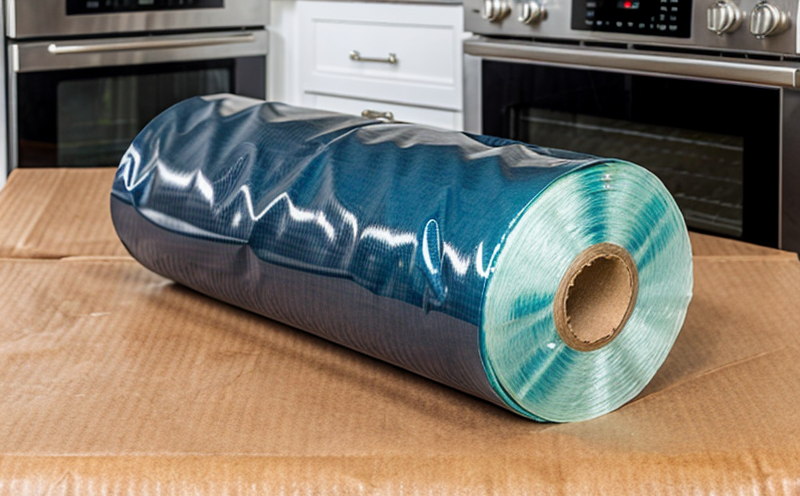ISO 1133 Melt Flow Index Testing of Plastic Wrap Materials
The ISO 1133 standard provides a method to determine the melt flow index (MFI) and melt volume flow rate (MVFR) of thermoplastics under controlled temperature and load conditions. This service is particularly important for household wrap materials, as it ensures that the plastic used in these products meets specific performance requirements in terms of processability and strength.
Understanding MFI is critical for quality managers, compliance officers, R&D engineers, and procurement teams involved with plastic wraps and covers. The MFI test measures how easily a thermoplastic flows from the die during extrusion under specified temperature and load conditions. This parameter is indicative of the polymer's molecular weight distribution and processing behavior.
The melt flow index testing ensures that household wrap materials are suitable for various applications, including food packaging, agricultural uses, and industrial applications. It helps in selecting the appropriate plastic type and grade to meet specific performance criteria such as heat resistance, tensile strength, and flexibility.
For instance, a high MFI value indicates a lower molecular weight distribution, resulting in easier processing but potentially less robust material. Conversely, a low MFI implies higher molecular weight distribution, which is more resistant to deformation under stress but may be harder to process. This service aids in finding the right balance between these two critical factors for optimal performance.
The test parameters include temperature (typically 230°C) and load (usually 2.16 kg or 5 kg), which are standardized as per ISO 1133:2020. Specimen preparation involves cutting the plastic wrap into standard dimensions, typically a 2.4 kg ± 0.02 kg block for MFI testing.
Instrumentation used in this service includes a melt flow indexer (MFI) machine that is capable of applying controlled temperature and load to the specimen. The machine measures the weight of plastic extruded through the die over a set time, which is then converted into MFI units.
Acceptance criteria for household wraps are stringent to ensure product quality. For instance, a typical acceptance limit might be an MFI value within ±10% of the target specification. This ensures that the wrap material meets the required performance standards and can be reliably used in its intended application without issues such as excessive sticking or tearing.
The importance of this service cannot be overstated for industries where plastic wraps are crucial, including food packaging, agriculture, and industrial manufacturing. By ensuring adherence to ISO 1133 standards, quality managers and compliance officers can maintain consistent product quality, while R&D engineers and procurement teams benefit from accurate data on material performance.
The process of melt flow index testing for household wrap materials involves several key steps: specimen preparation, machine setup, temperature and load application, extrusion measurement, and final calculation. Each step is critical to obtaining accurate results that reflect the true nature of the plastic's processing behavior.
Scope and Methodology
The scope of ISO 1133 Melt Flow Index Testing specifically targets thermoplastics used in household wraps. The methodology involves a controlled process that ensures consistency and accuracy across all tests performed by our laboratory.
To begin, the plastic wrap samples are prepared according to standard procedures. This includes cutting the specimen into blocks of uniform size suitable for testing on the MFI machine. The temperature is set at 230°C, which is the standard condition used in this test. A load of either 2.16 kg or 5 kg is applied based on the specific requirements of the material being tested.
The specimen is placed into the die of the MFI machine and heated until it melts. The machine then applies a constant pressure to extrude the melted plastic through the die at a controlled rate. The weight of the extruded material over a set period (typically 5 minutes) is measured, which directly relates to the melt flow index.
The resulting data from these tests are analyzed and reported according to ISO standards. This ensures that the results are reliable and can be compared across different batches or manufacturers. Acceptance criteria for household wraps typically specify an MFI value within a certain range, ensuring consistent performance.
Industry Applications
| Industry | Application |
|---|---|
| Agriculture | Protecting crops from harsh weather conditions and pests. |
| Food Packaging | Maintaining product freshness and protecting against contamination. |
| Pharmaceuticals | Ensuring sterile packaging of medications and medical devices. |
| Construction | Covering pipes or joints in wet areas to prevent water ingress. |
| Automotive | Making temporary covers for vehicle components during assembly.|
| Electronics | Protecting sensitive electronic parts from dust and moisture. |
The melt flow index testing is crucial in these industries as it helps ensure that the plastic wraps used are suitable for their intended applications. For example, in agriculture, a wrap with an appropriate MFI ensures effective protection of crops without compromising on breathability or durability. In food packaging, the right MFI guarantees that the wrap maintains its integrity during storage and transportation, thereby protecting the quality of the contents.
The testing also plays a vital role in ensuring compliance with international standards such as ISO 1133:2020 and ASTM D1238. This ensures that manufacturers and suppliers can meet regulatory requirements and provide products that are safe and effective for their intended use.
Use Cases and Application Examples
- Film packaging for fresh produce to extend shelf life.
- Covering pipes in construction sites to prevent water ingress during installation.
- Making temporary covers for electronics during transportation or storage.
- Protecting pharmaceuticals from contamination during transit.
- Covering agricultural equipment during maintenance.
The use cases are diverse, ranging from food packaging to industrial applications. By ensuring the correct MFI of plastic wraps, industries can improve product quality and reliability while also complying with safety regulations. This service is essential for maintaining consistent performance across different batches or manufacturers of household wrap materials.





